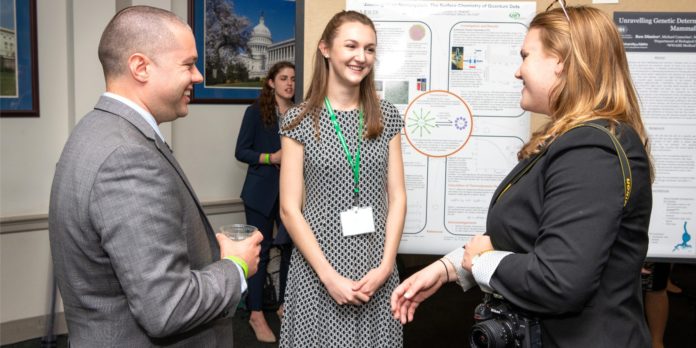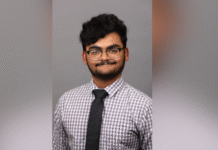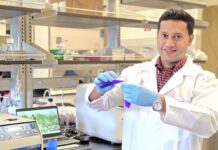MACON – Recent graduate Perry Hicks represented Mercer University at the highly selective Council on Undergraduate Research (CUR) Posters on the Hill event April 30 in Washington, D.C.
Hicks, a chemistry major from Thomson, was one of only 60 undergraduate students nationwide selected to advocate on Capitol Hill for undergraduate research. She spoke directly with Members of Congress and congressional staff members, including U.S. Rep. Jody Hice, U.S. Rep. Sanford Bishop and staff from the office of U.S. Sen. David Purdue.
Hicks discussed her research accomplishments as an undergraduate student at Mercer and how research has impacted her academic and professional goals. She also presented a poster, titled “‘Zooming in’ on Nanocrystals: The Surface Chemistry of Quantum Dots,” to those in attendance, including American Chemical Society (ACS) Board of Directors Chair John Adams.
“This was my first-time visiting D.C. and served as a grand finale to my research career here at Mercer,” said Hicks. “We were given the opportunity to advocate to Members of Congress the importance of undergraduate research as well as explore the area and visit many monuments and museums.”
Her research with Dr. Joseph Keene, assistant professor of chemistry, has focused on studying the surface modification of semiconductor nanocrystal quantum dots. These nanomaterials have applications in areas ranging from lighting and display technologies, harvesting solar energy and biomedical imaging. However, their properties must be tuned to their specific application.
Hicks has been investigating the ligand exchange reactions used to alter the surface chemistry and properties of quantum dots. Her work has led to the development and optimization of these reactions for efficiency and product formation without experiencing adverse effects to the optical and electrical properties of the nanomaterials.
“Perry is a highly motivated individual who represents the best of Mercer. Beyond the excellent work she has completed in the lab, she has been very effective at disseminating the results of her research beyond campus and has won multiple awards for her presentations,” said Dr. Keene. “Her research is timely and highly relevant to the scientific community, and her work has expanded the view and perspective of these nanoscale systems beyond the nanomaterial itself. She has highlighted the importance of not only the molecules at the surface, but also the role that the suspension matrix can play in determining the outcome of these reactions and the ultimate properties of the nanomaterials.”
After receiving her bachelor’s degree from Mercer on May 13, Hicks will begin pursing her Ph.D. in chemistry at Cornell University in July. She aspires to conduct research at a national laboratory and, one day, teach chemistry to undergraduates at a university like Mercer.
“I’m so grateful for the many research and presentation opportunities Dr. Keene has helped me secure over the years. Starting research in his lab early in my undergraduate career has proven to be the most significant choice I have made in college and has opened so many exciting doors for me,” she said.
CUR, in collaboration with ACS and other entities, holds the annual Posters on the Hill event to demonstrate the value of federal investment in undergraduate research. Institutions’ most talented researchers are judged by a national panel of experts in their fields, and only the best are chosen for the poster session on Capitol Hill. Past participants have gone on to contribute significantly to the research enterprise, such as scientist Sarah Caudill, who was part of the “discovery of the century” team that discovered gravitational waves.
“Each year, Posters on the Hill features a wide spectrum of fascinating research, scholarship and creative inquiry by some of the country’s most gifted student researchers,” said CUR Executive Officer Elizabeth L. Ambos. “It provides overwhelming evidence of the benefits of investment in undergraduate research not only for students, faculty mentors, institutions and communities but also for the nation and the world.”











